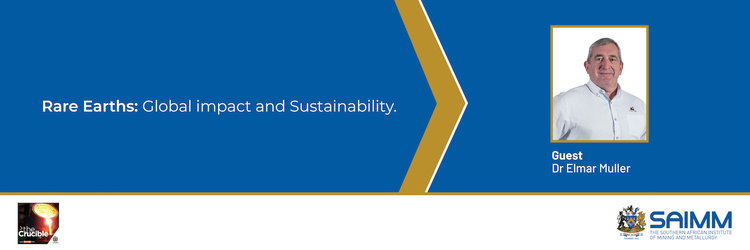
Rare Earths: Global Impact and Sustainability | Elmar Muller
Loading player...
In this episode, Dr Elmar Muller, Executive Manager: Hydrometallurgy at Mintek, talks to host Zelmia Botha about Rare Earths and the global impact and sustainability thereof.
The key points they discuss include Rare Earth minerals being abundant but difficult to mine and extract, with low concentrations in ores (around 0.3%). They are essential for many modern technologies like electronics, renewable energy, defence systems, etc. Global consumption is around 200,000-300,000 tons per year. China currently dominates the production (97% in 2011). Other countries like the US, Australia, and South Africa are investing in developing their own rare earth supply chains to reduce reliance on China.
The major challenges include high costs, environmental impact, lack of downstream processing facilities, and skills shortages. Recycling, finding alternatives, and reducing waste are key focus areas to improve sustainability.
Collaboration between the government, the private sector, and research institutions is crucial for South Africa to develop a rare earth industry. Dr Elmar also presents some action items that could assist South Africa to develop a Rare Earth industry.
Zelmia briefly mentions conferences like the Rare Earths Conference and the Battery Materials Conference which are being organised by the Southern African Institute of Mining and Metallurgy (SAIMM) which aim to facilitate such collaborations.
The key points they discuss include Rare Earth minerals being abundant but difficult to mine and extract, with low concentrations in ores (around 0.3%). They are essential for many modern technologies like electronics, renewable energy, defence systems, etc. Global consumption is around 200,000-300,000 tons per year. China currently dominates the production (97% in 2011). Other countries like the US, Australia, and South Africa are investing in developing their own rare earth supply chains to reduce reliance on China.
The major challenges include high costs, environmental impact, lack of downstream processing facilities, and skills shortages. Recycling, finding alternatives, and reducing waste are key focus areas to improve sustainability.
Collaboration between the government, the private sector, and research institutions is crucial for South Africa to develop a rare earth industry. Dr Elmar also presents some action items that could assist South Africa to develop a Rare Earth industry.
Zelmia briefly mentions conferences like the Rare Earths Conference and the Battery Materials Conference which are being organised by the Southern African Institute of Mining and Metallurgy (SAIMM) which aim to facilitate such collaborations.






